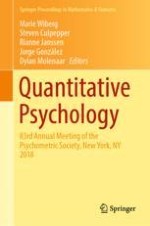
2019 | OriginalPaper | Chapter
Explanatory Item Response Theory Models: Impact on Validity and Test Development?
Author : Susan Embretson
Published in: Quantitative Psychology
Publisher: Springer International Publishing
Activate our intelligent search to find suitable subject content or patents.
Select sections of text to find matching patents with Artificial Intelligence. powered by
Select sections of text to find additional relevant content using AI-assisted search. powered by